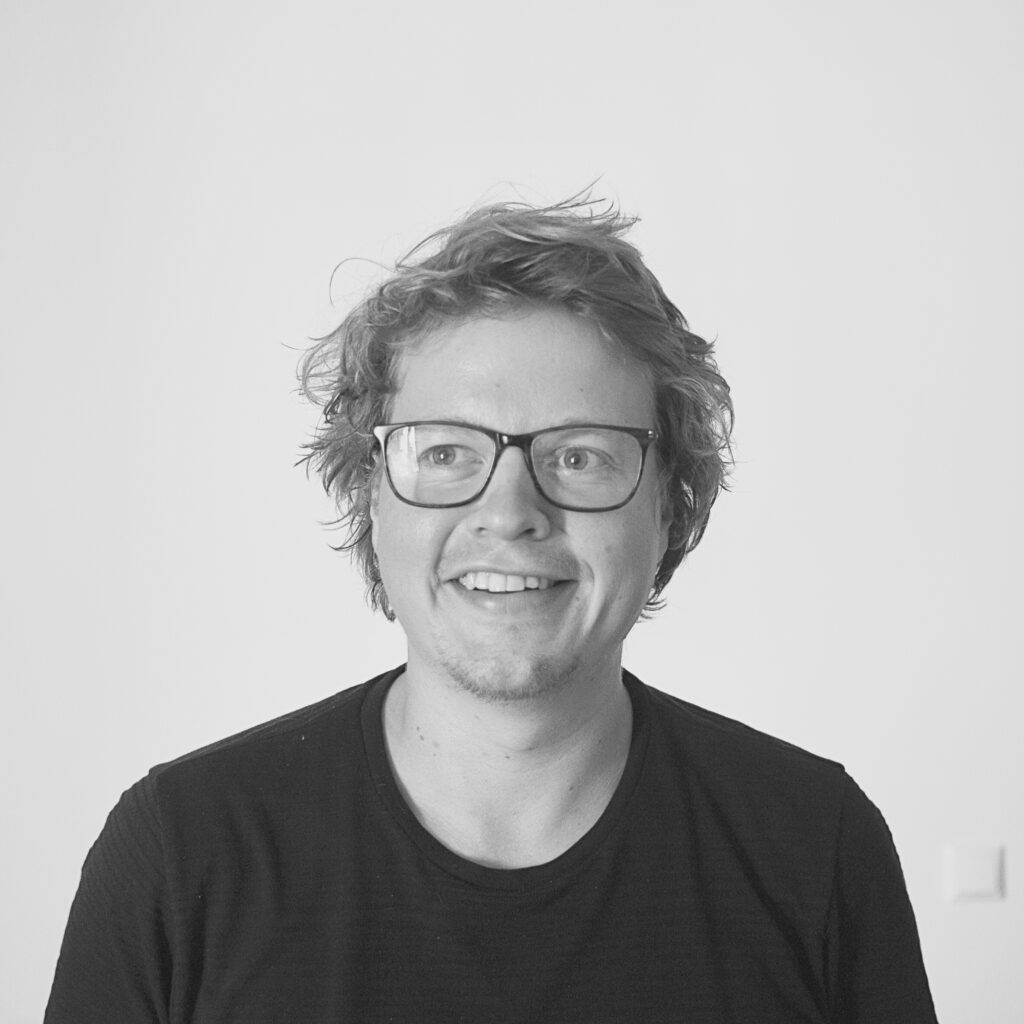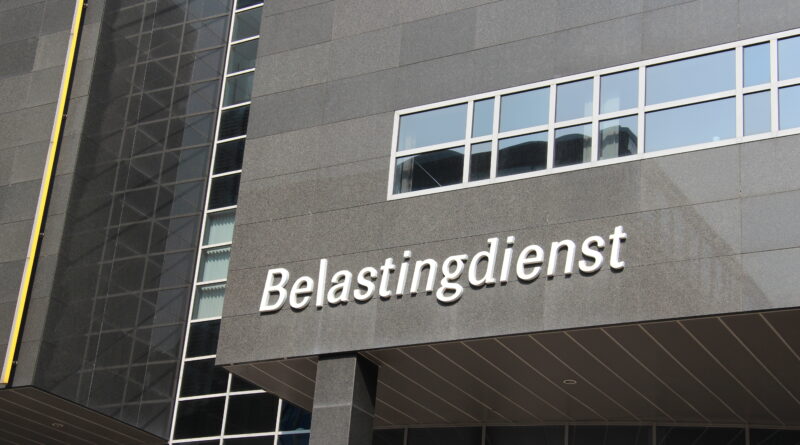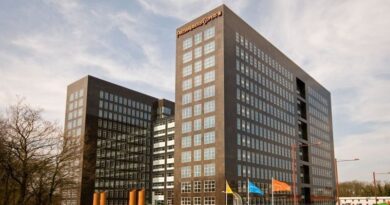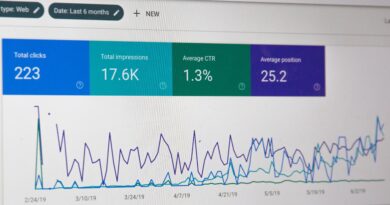Interview Belastingdienst: Work with impact
On a sunny Monday afternoon, we are at Esplanade. The temperature is just right to sit on the terrace without a coat. We doubt a little whether the person we see walking onto the terrace is the man we are looking for. We approach him and luckily, he turns out to be the right one: Erik Driessen. Erik works as a business analyst at the Belastingdienst, the Dutch tax administration. Today we are going to interview him to find out more about the Belastingdienst as an employer and how data helps the Belastingdienst in their work.
written by: Timo Klabbers & Flora Poon
Across from us Erik sits down, a man in his early thirties with curly hair and glasses. When he starts talking at a rapid pace, you can hear the enthusiasm bursting through. We can imagine that on birthdays, even the people who do not understand data analytics, like to listen to Erik. Not only does he work with large data sets during working hours, but he also dares to describe himself as an data art enthusiast. He even works on multiple projects in his spare time. One of his recent private projects is about visualizing and analyzing Avicii’s lyrics. By doing so he was able to generate a digital signature.
From marketing to data analytics
We will start with telling you how Erik got to this point in his life. As a graduated student from ICT and Media Design at Fontys Eindhoven, Erik has never thought about working as a data analyst. He started his career as a website designer at a marketing company. Later on, while writing his graduation project about influential users on Twitter, he got in touch with the data department of the company. This was his first experience in the field of data analysis. The feedback from the company about the project was so positive, that he kept working in that department for about seven or eight years, working in multiple teams with different positions. Afterwards, in 2020, he came in contact with the Belastingdienst. His openness towards a new challenge gave him the drive to accept the offer to work as a data analyst at the Belastingdienst.
Since he has originally studied ICT and Media Design, his theoretical knowledge is based on the experience from the companies and departments in which he has worked in. Mainly his open mindedness towards the opportunities that he got, brought him all the knowledge he needed to do his current job.
On paper, Erik is a Business Analyst, a position where you mainly map out business processes. But the position is much more technical within the data department (Erik often refers to the department by its abbreviation DF&A, which stands for ‘Datafundamenten & Analytics’). Everyone in his team does “a little bit of everything”, but Erik focuses on the communication. In a small team with about 5 colleagues, Erik works on questions that are put forward by other teams within the Belastingdienst. His department, DF&A (around 350 employees), develops products based on data analyses that helps Belastingdienst to work more effectively. Here you can think of dashboards and models that help call agents to decide to set up a payment arrangement. Erik’s team is predominantly busy with answering questions based on data that are put forward by the Small and Medium Enterprises (SMEs, Dutch: MKB) department. The team falls under a bigger DF&A department, which offers activities varying from designing risk models to supplying real-time information, and from answering questions from the Dutch House of Representatives to the Fiscale Inlichtingen en Opsporingsdienst (FIOD). In these activities, often someone from DF&A is involved. The Belastingdienst has one of the largest datasets of The Netherlands. The DF&A uses this data to make models, so the work of the Belastingdienst can be done more efficiently and added value can be delivered to citizens and companies.
The life of a data analyst
According to Erik, one of the best things about his job is explaining the results to the customer: “If you notice that the customer is getting excited about the product, the project becomes more fun. I see it as a kind of Venn diagram: you have the data side and the world of the customer and there is an overlap between them. As a data analyst you sometimes have to compromise, but the customer must also be curious about your world. When that happens, you work on fun projects.”
When we ask Erik whether he prefers to explain his work to other data analysts or to colleagues who don’t have much knowledge of data or analytics, he states that he enjoys the latter category more: “I always enjoy sparring with someone, but in that regard, it might be nicer to explain it to someone with very little experience. You are then very much challenged to explain in such a way that what you want to tell comes across right.” Sometimes Erik has to make a choice: does he tell everything in detail, with the risk that somebody will not understand everything, or does he simplify the story, but then not everything will be explained. He finds it most important that people get enthusiastic about his ideas and results, because then they will take the time to also understand the hard parts.
Erik needs a lot of data to answer the questions he gets. This data is received by the Belastingdienst in many different ways. Data from individuals, small and medium-sized enterprises, and multinationals are collected on a legal basis. It is important to note here that a legal basis is required here in order to gather data, haphazardly gathering data is not allowed. There has to be some kind of binding goal here. Much of the gathered data can be used to extract information through models and analyses. Another team within his department first prepares the data and puts it in a modern system. This way, the time spent on data preparation by analysts is greatly reduced. Fun fact: the Belastingdienst has access to 6 petabytes of data. That is 6 million gigabytes, or the same amount of data used when you would stream Netflix movies for over 600 years.
Of course, all this data owned by the Belastingdienst, is very sensitive to privacy. The fact that they have access to that data does not mean that you can use that data just like other ordinary things. There are strict legal requirements before they can use the collected data. As noted before, there has to be some kind of objective, and haphazardly gathering data is not allowed. Erik is happy that he does not have to do so much with these legal frameworks and that he and his team can focus on developing models: “The good thing is that a lot of noise is kept away from the development team. Before we get a question, all kinds of checks and balances have already been done.” However, during a project, legal questions may arise. The department Erik works at can count on the support of a dedicated privacy team: “The great thing is that those teams are very approachable. You can always walk into their office at any time.”
Belastingdienst as employer
At the Belastingdienst, there are many vacancies, particularly in the data analytics department where Erik works, where they are often looking for more eyes and brains. There is simply not enough capacity to catch up with all the questions of their clients. Therefore, they have to make a selection of the most important orders and they have to refuse others.
Erik would love to welcome some new colleagues from a younger generation. He does think that working for the government has three main advantages. First of all, the working conditions are good. Currently he works for four days, such that he is able to spend more time on his own data projects. Furthermore, working for a government institution has social value to him. Previously, when he was working for a marketing company, he was doubting the reason behind designing models and analyzing data. Nowadays, he is designing models that can help the Dutch society. Last but not least, the working environment is open and all his colleagues are approachable. Erik explains that he has many individual meetings with his colleagues and his clients to get to know each other. No matter what your position is or in which team you are working, everyone is available to have a meeting with you. This has particularly helped him with the transition to becoming a professional data analyst.
Development
Talking about big differences when working for the Belastingdienst, Erik names one more: the products are carefully made, but that often takes a little more time. “The government has many more standards and much more regulations. It is a good thing that these rules exist, because that way we can make more valuable products, but these products take longer to be ready for use.” The products and models made by Erik almost by definition affect people. He therefore emphasizes the importance of maintaining this level of care. “You are dealing with very sensitive data. When we set up a process, or make a model, the question is not whether it affects people, but how.” What he means here is that the goal of the models is mainly to help people in fulfilling their fiscal obligations in an easy way.
Twice a year, a three-day Hackaton is held by the data department within the Belastingdienst in the context of innovation. In this event, you are allowed to work on any project of your preference. This may be an analytical question or a new technical development that you want to apply. The only restriction is that you may not implement the result of your project. This means that you are not allowed to change any processes within the company based on the outcome of your research. However, if your investigation is interesting enough, you may get into a process which could lead to new product production. That is, first getting a follow up of three weeks to deepen your research. If your feedback is positive, you will get another three months to design a test product, which could be finalized to a fitting model within the system of the Belastingdienst. According to Erik, it is unique to see a company so actively involved in finding renewal ideas to improve their processes. According to him, innovation is a topic that is quite difficult to utilize in a company. Giving all employees the chance to find new methods and to do their own research is something he admires a lot.
For the future, the Belastingdienst in general would like to improve outdated IT systems. This is something they are currently working on, but it is a difficult task. As you could imagine, it is not possible to simply turn off the system for a period of time. They have to improve the program and at the same time maintain the old system until they can make the transfer. For the data analysis department specifically, Erik thinks that the future will bring more data, more advanced models, and larger computers. Nevertheless, we are still living in a world in which some companies are limited in their understanding of complicated models. The key is to find the golden ratio between building more developed, but at the same time intelligible programs.
In short, despite the fact that most econometricians do not immediately think of a job at the Belastingdienst, it is an employer that can supply you with interesting work. The large team with incredible amounts of data gets very diverse questions. And finding answers to these questions can have an immediate impact on the people involved. In addition, the Belastingdienst offers a lot of room for personal development and innovation, with the hackathon being one of the most appealing examples.

Erik Driessen is Business Analist at the Belastingdienst. At his department DF&A they develop product based on data analyses.
More about DF&A on the website of the Belastingdienst




